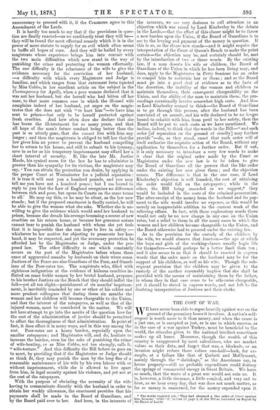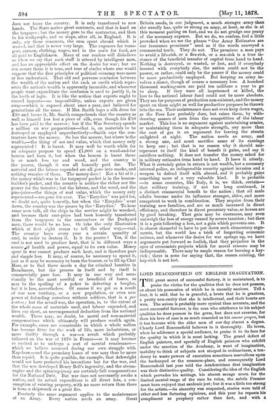THE COST OF WAR.
WE have never been able to argue heartily against war on the ground of the pecuniary losses it involves. A nation's self- respect is worth more to it than money, and when the cause is a just one, or is accepted as just, or is one in which success, as in the case of a war against Turkey, must be beneficial to the world, the stimulus given to the national intellect sometimes makes up all losses. Moreover, though the wealth of this country is exaggerated by most calculators, who use market values as their data, and forget that war, a blockade, or an invasion might reduce those values one-half—look, for ex- ample, at a failure like that of corbett and McClymont, mainly through the "shrinkage," as the Americans say, in house property—still no probable expenditure could destroy the springs of commercial energy in Great Britain. We have so much, that the waste of a great war would not ruin us. It is, however, a little tiresome, a little comical, and very sad to hear, as we hear every day, that war does not much matter, as far as money is concerned, for the money expended upon it
• The words required are, "They had obtained a like order of Court against him, because," after "if," in line 12, page 2, of the Bill as Amended on Report by the Home of Lords.
does not leave the country. It is only transferred to new hands. The State makes great contracts, and that is hard on the taxpayer; but the money goes to the contractor, and then to his workpeople, and so stops, after all, in England. It is only, say these reasoners, the sum spent abroad which is wasted, and that is never very large. The expenses for trans- port, cannon, clothing, wages, and in the main for food, are all paid to Englishmen. Many of our readers will disbelieve us when we say that such stuff is uttered by intelligent men, and has an appreciable effect on the desire for war ; but we can assure them it is true, and true of circles where one would suppose that the first principles of political economy were more or less understood. That old and perverse confusion between the wealth of the nation and the cash or credit which repre- sents the nation's wealth is apparently incurable, and whenever people want expenditure the confusion is used to justify it, in the teeth of logic. It is like the notion that exports ought to exceed imports—an impossibility, unless exports are given away—which is exposed about once a year, and believed for generations all the same. If Mrs. Smith buys a silk dress for £10 and burns it, Mr. Smith comprehends that the country as well as himself has lost a piece of silk, even though his .£10 has been paid to the mercer ; but if the War Secretary spends a million on war preparations—that is, on materials to be destroyed or employed unproductively—Smith says the con- tractors have the money. So has the mercer, but where is the wealth,—the thing of use and value, which that money only represented ? It is burnt. It may well be worth while for an adequate purpose to spend £1,000 on a wood-and-tar beacon and burn it, but when the beacon is burnt there is so much less tar and wood, and the country is the poorer, though it was all honestly paid for. The material and the labour expended are all gone into smoke, and nothing remains of them. The money does ? Not a bit of it ; the money which was in the taxpayers' pocket is in the beacon- builder's pocket, and the country is neither the richer nor the poorer for the transfer ; but the labour, and the wood, and the pine-juice—the things of real value, which the money only represented—are gone for ever. The 'Eurydice ' was paid for, we doubt not, quite honestly, but when the ' Eurydice ' went down, the country was the poorer by the 'Eurydice.' To hear some men talk, all the ships in the service might be wrecked, and because their cost-price had been honestly transferred from the taxpayers to the contractors or the Dockyard men, there would be no loss. Or take the only illustration which at first sight seems to tell the other way,—coal. The country buys every year a certain quantity of coal, in order to destroy it. Is it the poorer ? Yes, if the coal is not used to produce heat, that is in different ways a source aof health and power, equal to its own value. Money spent in war cannot produce such heat, and is therefore pure and simple loss. It may, of course, be necessary to spend it, just as it may be necessary to burn the beacon, or to fill up Chat Moss, or to find three meals a day for criminal lunatics in Broadmoor, but the process in itself and by itself is commercially pure loss. It may in one way and occa- sionally be the most needful or beneficial of losses, as may be the spoiling of a poker in defeating a burglar, but it is loss, nevertheless. Of course if we get as a result of war new territory, or a new population, or even new power of defending ourselves without soldiers, that is a per contra ; but the actual war, the operation, is, to the extent of the whole mass of materials used, and labour expended, and lives cut short, an uncompensated deduction from the national wealth. There may, no doubt, be moral and non-material compensations which ultimately will produce wealth again. For example, cases are conceivable in which a whole nation has become fitter for the work of life, more industrious, or more thrifty through a war—a result which probably followed on the war of 1870 in France—or it may become so excited as to undergo a sort of mental renaissance— which we believe occurred during our own struggle with Napoleon—and the pecuniary losses of war may thus be more than repaid. It is quite possible, for example, that Arkwright would not have perfected his inventions but for the war, and that the war developed Henry Bell's ingenuity, and the steam- engine and the spinning-jenny are certainly full compensations for the National Debt. But war does not necessarily awake a nation, and its actual expenditure is all direct loss, a con- sumption of existing property, with no more return than there is from a shipwreck or a great fire.
Precisely the same argument applies to the maintenance of an Army. Every nation needs an army. Great IBritain needs, in our judgment, a much atrpnger a,rmy•than I she usually has, quite as strong an army, at least, as she is, at this moment potting on foot, and we d9 not grudge, one penny of the necessary expense. But we do, we confess, feel a little provoked when we see the phrase "Our Army Estimates are our insurance premiums" used as if the words conveyed a commercial truth. They do not. The premium a, man pays to avoid a life-risk, or a fire-risk, or a sea-risk is a true in- stance of the beneficial transfer of capital from hand to hand. Nothing is destroyed, or wasted, or lost, and if everybody insured with everybody else, the nation could not be the poorer, or rather, could only be the poorer if the money could be more productively employed. But keeping an army in- volves a direct, though of course a necessary loss. A hundred thousand working-men are paid ten millions a year to go to sleep. If they were all imprisoned or killed, the loss to the national labour fund could not be more absolute. They are for purposes of production non-existent, and the money spent on them might as well for productive purposes be thrown into the sea. Their maintenance does not even keep down wages, as the Poor Law probably does, but raises them, by with- drawing masses of men from the competition of the labour market. This loss is no argument against maintaining armies, or maintaining them in adequate strength, any more than the cost of gas is an argument for leaving the streets unlighted at night. The nation needs an army, and a strong one, and must sacrifice acme of its earnings to keep one ; but that is no reason why it should mis- represent to itself the kind of benefit it gains, and say it sacrifices nothing. It does not transfer the money asked for in military estimates from hand to hand. It loses it utterly. What it certainly gains in return is not wealth, but a necessary internal police, an indispensible security against invasion and a weapon to defend itself with abroad, and it probably gains something more of a very valuable kind. It is probable —in some countries, like Italy, it is, we think, certain— that military training, if not too long continued, is a distinct commercial benefit to the nation ; that all male adults become under its influence stronger, abler, .and more competent to work in combination. They acquire .from, their training new faculties, and are as much increased in direct efficiency, and therefore in direct pecuniary value, as horses are by good breaking. That gain may be enomous, may even outweigh the loss of energy caused by severe taxation ; but then it is a gain following a loss, not a gain which prevents one. It is almost shameful to have to put down such elementary argu- ments, but the world has a trick of forgetting economic axioms, and whenever the desire for war springs up, we have arguments put forward so foolish, that they prejudice in the eyes of economists projects which for moral reasons may be indispensable. There may be ample reason for burning a hay- rick ; there is none for saying that, the reason existing, the hay-rick is not lost.







































 Previous page
Previous page